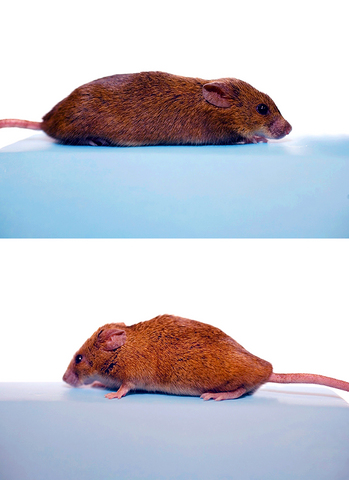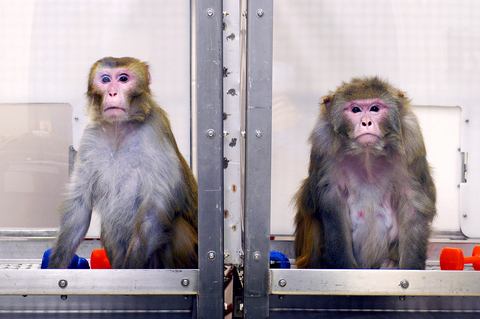How depressing, how utterly unjust, to be the one in your social circle who is aging least gracefully.
In a laboratory at the Wisconsin National Primate Research Center, Matthias is learning about time's caprice the hard way. At 28, getting on for a rhesus monkey, Matthias is losing his hair, lugging a paunch and getting a face full of wrinkles.
Yet in the cage next to his, gleefully hooting at strangers, one of Matthias' lab mates, Rudy, is the picture of monkey vitality, although he is slightly older. Thin and feisty, Rudy stops grooming his smooth coat just long enough to pirouette toward a proffered piece of fruit.

PHOTOS: NY TIMES NEWS SERVICE
Tempted with the same treat, Matthias rises wearily and extends a frail hand. "You can really see the difference," said Ricki Colman, an associate scientist at the center who cares for the animals.
What a visitor cannot see may be even more interesting. As a result of a simple lifestyle intervention, Rudy and primates like him seem poised to live very long, very vital lives.
This approach, called calorie restriction, involves eating about 30 percent fewer calories than normal while still getting adequate amounts of vitamins, minerals and other nutrients. Aside from direct genetic manipulation, calorie restriction is the only strategy known to extend life consistently in a variety of animal species.

How this drastic diet affects the body has been the subject of intense research. Recently, the effort has begun to bear fruit, producing a steady stream of studies indicating that the rate of aging is plastic, not fixed, and that it can be manipulated.
In the last year, calorie-restricted diets have been shown in various animals to affect molecular pathways likely to be involved in the progression of Alzheimer's disease, diabetes, heart disease, Parkinson's disease and cancer. Earlier this year, researchers studying dietary effects on humans went so far as to claim that calorie restriction may be more effective than exercise at preventing age-related diseases.
Monkeys like Rudy seem to be proving the thesis.

The findings cast doubt on long-held scientific and cultural beliefs regarding the inevitability of the body's decline.
"Calorie restriction has the potential to help us identify anti-aging mechanisms throughout the body," said Richard Weindruch, a gerontologist at the University of Wisconsin who directs research on the monkeys.
Aging is a complicated phenomenon, the intersection of an array of biological processes set in motion by genetics, lifestyle, even evolution itself.
Still, in laboratories around the world, scientists are becoming adept at breeding animal Methuselahs, extraordinarily long lived and healthy worms, fish, mice and flies.
In 1935, Clive McCay, a nutritionist at Cornell University, discovered that mice that were fed 30 percent fewer calories lived about 40 percent longer than their free-grazing laboratory mates. The dieting mice were also more physically active and far less prone to the diseases of advanced age.
McCay's experiment has been successfully duplicated in a variety of species. In almost every instance, the subjects on low-calorie diets have proven to be not just longer lived, but also more resistant to age-related ailments.
"In mice, calorie restriction doesn't just extend life span," said Leonard Guarente, professor of biology at the Massachusetts Institute of Technology. "It mitigates many diseases of aging: cancer, cardiovascular disease, neurodegenerative disease. The gain is just enormous."
For years, scientists financed by the National Institute on Aging have closely monitored rhesus monkeys on restricted and normal-calorie diets. At the University of Wisconsin, where 50 animals survive from the original group of 76, the differences are just now becoming apparent in the older animals.
Those on normal diets, like Matthias, are beginning to show signs of advancing age similar to those seen in humans. Three of them, for instance, have developed diabetes, and a fourth has died of the disease. Five have died of cancer.
But Rudy and his colleagues on low-calorie meal plans are faring better. None have diabetes, and only three have died of cancer. It is too early to know if they will outlive their lab mates, but the dieters here and at the other labs also have lower blood pressure and lower blood levels of certain dangerous fats, glucose and insulin.
"The preliminary indicators are that we're looking at a robust life extension in the restricted animals," Weindruch said.
Mike Linksvayer, a 36-year-old chief technology officer at a San Francisco nonprofit group, embarked on a calorie-restricted diet six years ago. On an average day, he eats an apple or some cereal for breakfast, followed by a small vegan dish at lunch. Dinner is whatever his wife has cooked, excluding bread, rice, sugar and whatever else Linksvayer deems unhealthy (this often includes the entree). On weekends, he occasionally fasts.
Linksvayer, 182cm and 61kg, estimated that he gets by on about 2,000 to 2,100 calories a day, a low number for men of his age and activity level, and his blood pressure is a remarkably low 112 over 63. He said he has never been in better health.
"I don't really get sick," he said. "Mostly I do the diet to be healthier, but if it helps me live longer, hey, I'll take that, too."
Researchers at Washington University in St. Louis have been tracking the health of small groups of calorie-restricted dieters. Earlier this year, they reported that the dieters had better-functioning hearts and fewer signs of inflammation, which is a precursor to clogged arteries, than similar subjects on regular diets.
In previous studies, people in calorie-restricted groups were shown to have lower levels of LDL, the so-called bad cholesterol, and triglycerides. They also showed higher levels of HDL, the so-called good cholesterol, virtually no arterial blockage and, like Linksvayer, remarkably low blood pressure.
These studies and others have led many scientists to believe they have stumbled onto a central determinant of natural life span. Animals on restricted diets seem particularly resistant to environmental stresses like oxidation and heat, perhaps even radiation. "It is a very deep, very important function," Miller said. Experts theorize that limited access to energy alarms the body, so to speak, activating a cascade of biochemical signals that tell each cell to direct energy away from reproductive functions, toward repair and maintenance. The calorie-restricted organism is stronger, according to this hypothesis, because individual cells are more efficiently repairing mutations, using energy, defending themselves and mopping up harmful by-products like free radicals.
Some ethicists believe that the all-out determination to extend life span is veined with arrogance. As appointments with death are postponed, says Leon Kass, former chairman of the President's Council on Bioethics, human lives may become less engaging, less meaningful, even less beautiful.
"Mortality makes life matter," Kass recently wrote. "Immortality is a kind of oblivion — like death itself."

April 28 to May 4 During the Japanese colonial era, a city’s “first” high school typically served Japanese students, while Taiwanese attended the “second” high school. Only in Taichung was this reversed. That’s because when Taichung First High School opened its doors on May 1, 1915 to serve Taiwanese students who were previously barred from secondary education, it was the only high school in town. Former principal Hideo Azukisawa threatened to quit when the government in 1922 attempted to transfer the “first” designation to a new local high school for Japanese students, leading to this unusual situation. Prior to the Taichung First

The Ministry of Education last month proposed a nationwide ban on mobile devices in schools, aiming to curb concerns over student phone addiction. Under the revised regulation, which will take effect in August, teachers and schools will be required to collect mobile devices — including phones, laptops and wearables devices — for safekeeping during school hours, unless they are being used for educational purposes. For Chang Fong-ching (張鳳琴), the ban will have a positive impact. “It’s a good move,” says the professor in the department of

On April 17, Chinese Nationalist Party (KMT) Chairman Eric Chu (朱立倫) launched a bold campaign to revive and revitalize the KMT base by calling for an impromptu rally at the Taipei prosecutor’s offices to protest recent arrests of KMT recall campaigners over allegations of forgery and fraud involving signatures of dead voters. The protest had no time to apply for permits and was illegal, but that played into the sense of opposition grievance at alleged weaponization of the judiciary by the Democratic Progressive Party (DPP) to “annihilate” the opposition parties. Blamed for faltering recall campaigns and faced with a KMT chair

Article 2 of the Additional Articles of the Constitution of the Republic of China (中華民國憲法增修條文) stipulates that upon a vote of no confidence in the premier, the president can dissolve the legislature within 10 days. If the legislature is dissolved, a new legislative election must be held within 60 days, and the legislators’ terms will then be reckoned from that election. Two weeks ago Taipei Mayor Chiang Wan-an (蔣萬安) of the Chinese Nationalist Party (KMT) proposed that the legislature hold a vote of no confidence in the premier and dare the president to dissolve the legislature. The legislature is currently controlled